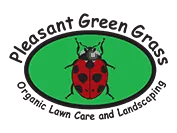Adapted from Organic Landscape Alliance, Toronto, Canada http://www.organiclandscape.org/
Chemical pesticides threaten the health of children and pets. Children and pets are the most vulnerable segment of our population due to their small size and their underdeveloped physiology. Children are also often the most exposed to pesticides due to their behavior (putting contaminated grass, soil and toys into mouth, breathing close to the ground) and small size. Increased exposure puts children at an unacceptably high risk from lawn pesticides.
Chemical pesticides and fertilizers contaminate surface and groundwater. Lawn pesticides and fertilizers can contaminate surface and groundwater. This diminishes the quality of our drinking water as well as the quality of aquatic habitats and health of aquatic life forms.
Lawn chemicals are unnecessary. Historically, organic lawn care has been practiced for much longer than chemical lawn care and it can easily be implemented on any lawn.
Chemical pesticides threaten the health of local wildlife. Turf-dwelling and feeding species such as the American robin, Canadian goose, raccoon and eastern gray squirrel are highly exposed to lawn chemicals.
Chemical pesticides and fertilizers reduce the activity of beneficial organisms. Healthy soil is alive with a variety of beneficial organisms that actually kill pest insects, decrease the spread of disease and help plants gather nutrients and water. For example, earthworms improve air and water circulation, decompose thatch, deposit nutrient-rich castings and help to neutralize soil (plants prefer this pH). Many of these beneficial organisms are highly exposed and highly sensitive to lawn chemicals. Pesticides and fertilizers reduce their activity levels, thereby reducing a lawn’s natural ability to control pests and diseases, gather nutrients and water and maintain overall health.
Local wildlife need safe places to live. As more and more suburbs encroach upon natural habitats, wildlife are forced to flee or adapt to less ideal, often crowded habitats ripe with potential dangers. Exposure to lawn chemicals is one such danger. Direct exposure to these pesticides and fertilizers is dangerous, as are the effects of chemical use including decreased shelter and food opportunities.
Chemical fertilizers are a waste of money. Chemical fertilizers usually contain three macronutrients – phosphorus, potassium and nitrogen. They lack other macro as well as micronutrients and include no organic matter or microbes.
Chemical pesticides have the potential to cause damage throughout their lifecycles. All stages of a pesticide’s lifecycle – production, transport, storage, use and disposal – have the potential to degrade environmental and human health. Explosions, spills and volatilization may occur in manufacturing plants, storage facilities and en route, exposing potentially huge numbers of non-target organisms to pesticides.
Chemicals actually degrade the over-all long-term health of your lawn and garden. Chemical lawn care is the wrong approach. By frequently applying pesticides to your lawn, you may create a chemical-dependent landscape. As pest species become resistant to the chemicals designed to kill them, more concentrated doses and frequent applications are required and a never-ending cycle of increasing pest resistance and pesticide use is established.


